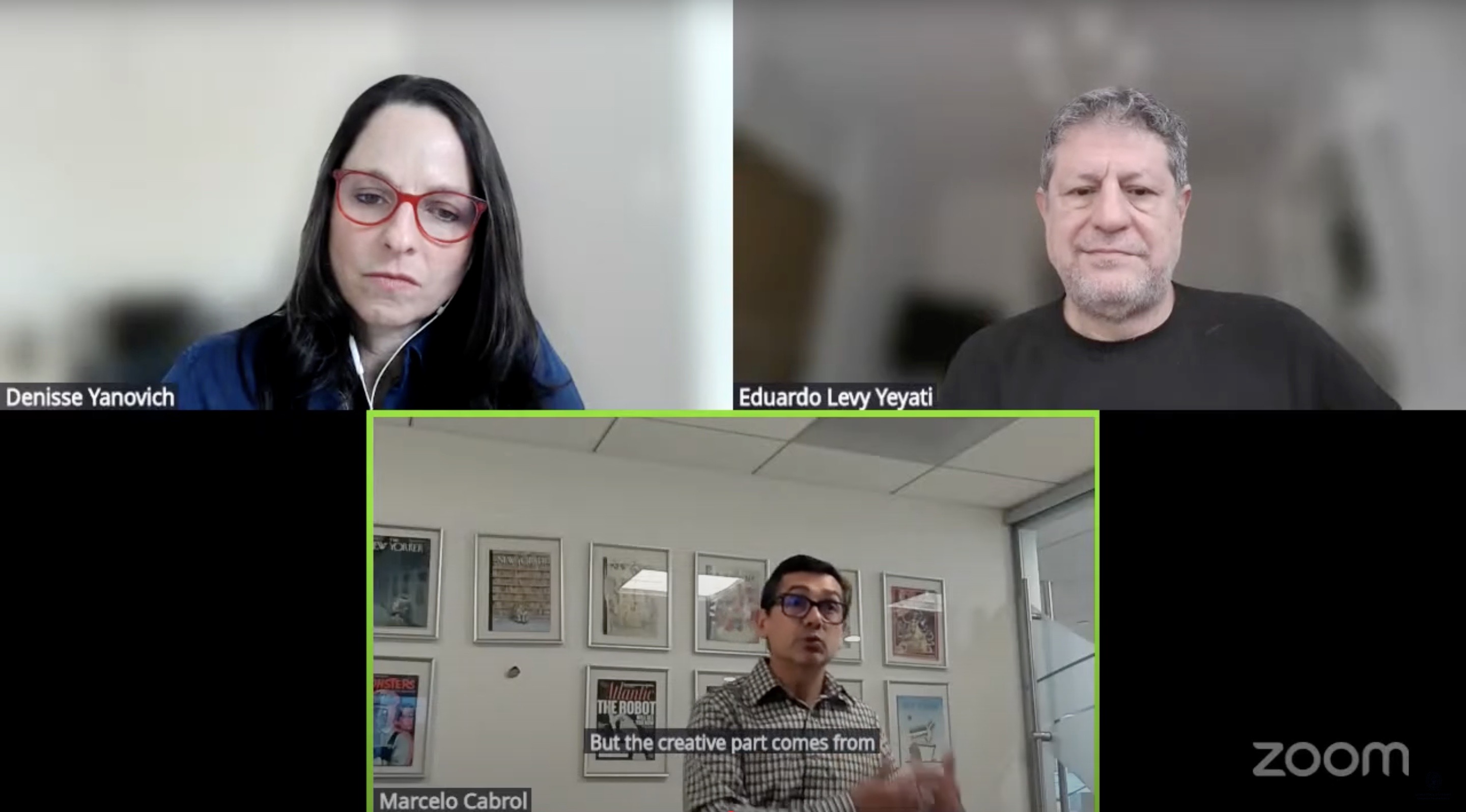AI and the Future of Work in Latin America: Risks, Opportunities, and Institutional Challenges
On May 27, 2025, the Georgetown Americas Institute, in partnership with the Latin America Policy Association (LAPA), hosted a timely conversation on how artificial intelligence (AI) is reshaping labor markets in Latin America and the Caribbean. The event featured Eduardo Levy Yeyati, senior fellow at Brookings and professor at Universidad Torcuato Di Tella, and Marcelo Cabrol, division chief at IDB Lab, with moderation by GAI Managing Director Denisse Yanovich. The discussion examined the risks of job displacement, the opportunities of AI-driven tools for workforce development, and the institutional responses needed to manage the region’s technological transition.

Automation Risks and Job Vulnerability
Yeyati drew insights from his book Automatizados: Vida y trabajo en tiempos de inteligencia artificial (Automated: Life and Work in Times of Artificial Intelligence, 2024), where he examines the disruptive potential of AI for Latin America’s labor markets. He emphasized that automation’s impact will not be evenly distributed across the workforce, and that the asymmetry itself poses one of the greatest challenges for policymakers. In his view, the central issue is not only how many jobs are at risk, but also which types of jobs and how quickly displacement may unfold.
“In a nutshell, the argument is that unless you show me that the job will be anything different that the ones that have been replaced then the usual job will be substituted as well, because what we have here is essentially a technology that is substituting the function of a human worker rather than a particular task”- Levy Yeyati.
Yeyati emphasized that the disruptive impact of AI will not be evenly distributed across the labor market. He pointed to a hollowing out of routine, middle-skill jobs, particularly in sectors such as manufacturing, call centers, back-office services, and some administrative functions. While the region’s high levels of informality may shield certain occupations from immediate replacement, it also complicates the transition since displaced workers often lack access to retraining or unemployment benefits. Yeyati underscored that the main concern is not only the volume of jobs at risk but also the speed at which displacement could occur, which may overwhelm already fragile labor institutions. In his view, governments cannot afford to underestimate the magnitude of the adjustment challenge that lies ahead.
Opportunities for Skills and Inclusion
Cabrol shifted the focus of the discussion toward the opportunities that AI could generate if framed as part of a broader public good agenda. He acknowledged that the same technologies displacing workers could also serve as transformative instruments for training, mobility, and social inclusion. In his view, AI-powered platforms hold particular promise because of their ability to deliver personalized learning at scale, adapt to individual skill levels, and open pathways into higher-value sectors. Cabrol highlighted digital services, renewable energy, and health technology as areas where reskilling initiatives could create sustainable opportunities for the region’s workforce.
However, he stressed that realizing this potential depends on deliberate public investments and policies that treat access to digital infrastructure, connectivity, and training as collective goods rather than private benefits. He warned that without this framing, the advantages of AI would remain concentrated among privileged groups with access to high-quality education and reliable internet. Cabrol argued that governments, multilateral institutions, and private actors must collaborate to ensure that AI-driven tools reach historically excluded populations, including rural workers, women, and youth. By embedding AI within a public good framework, Cabrol suggested, Latin America could not only mitigate the risks of disruption but also transform automation into a vehicle for reducing inequality and expanding mobility.
“You have currently a lot of money going into financial services for the tops of the pyramids (AI), a lot of money going into commercial platforms, however, there is less money going into what has an important public good component like health and education”- Marcelo Cabrol.
Institutional Readiness and Policy Challenges
Both speakers agreed that institutional readiness will be the decisive factor shaping whether AI reduces or exacerbates inequality in Latin America. Yeyati stressed the need for adaptive public policies, ranging from stronger social safety nets and portable benefits to more flexible labor regulations that can respond to changing patterns of work. He also emphasized the importance of creating metrics to track not just job losses, but also the quality and inclusivity of new opportunities generated by technological adoption. Cabrol added that regional and multilateral institutions such as the Inter-American Development Bank (IDB) will be critical partners in this process, providing financing, technical assistance, and knowledge-sharing to help countries experiment with pilot programs that can later be scaled. Both warned that weak institutional capacity, combined with fiscal constraints and political polarization, could limit governments’ ability to respond proactively to the labor market disruptions caused by AI.
Q&A Session
During the Q&A, the conversation turned to the broader implications of AI adoption, including ethics, regulation, and private sector engagement. Yeyati responded to a question on innovation by cautioning against a “wait-and-see” approach. He argued that the region cannot afford to delay, since preparing for AI’s disruptive effects requires building skills, institutions, and regulations today rather than after displacement has already occurred. Cabrol addressed concerns about over-regulation, noting that governments must strike a careful balance: too little oversight risks deepening inequality and exploitation, while too much could stifle innovation and investment. Audience questions also raised the issue of educational reform, where both speakers agreed that schools and universities must evolve rapidly to equip students with both digital and soft skills for a changing economy. Finally, Cabrol reiterated that AI should not be seen solely as a threat, but as a catalyst for more inclusive labor systems—if policymakers commit to treating human capital as central to the region’s growth strategy.
